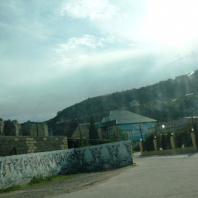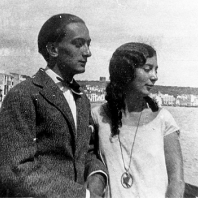Ядерный шантаж мира от кремлевских мечтателей
 aillarionov — 08.10.2014
В сокращенном переводе на русский язык этой статьи
Г.Рахмана из «Файненшнл Таймс» (http://www.inopressa.ru/article/07Oct2014/ft/looking_glass.html)
отсутствуют, пожалуй, самые
«сочные»
кусочки ее оригинала (некоторые их них выделены жирным
шрифтом
ниже):
aillarionov — 08.10.2014
В сокращенном переводе на русский язык этой статьи
Г.Рахмана из «Файненшнл Таймс» (http://www.inopressa.ru/article/07Oct2014/ft/looking_glass.html)
отсутствуют, пожалуй, самые
«сочные»
кусочки ее оригинала (некоторые их них выделены жирным
шрифтом
ниже):Russia through the nuclear looking glass
October 6, 2014 4:32 pm
By Gideon Rachman
In Moscow the biggest danger is said to be that Ukraine decides to give war a chance
Is Vladimir Putin a wimp? The Russian president has a macho image and has shocked the west with his annexation of Crimea. But, in Moscow, there are hardliners who seem frustrated that he has not gone further.
One such is Vyacheslav Nikonov, who is chairman of the Russian parliament’s education committee and the grandson of Vyacheslav Molotov, who served as Joseph Stalin’s foreign minister for many years. Mr Nikonov describes Mr Putin’s policies in Ukraine as “very cautious”. Sitting in Mr Nikonov’s office in the Duma last week, I asked how his grandfather would have handled Ukraine. Flushing slightly, he replied: “Molotov would have invaded Ukraine and taken it in a week.”
If Mr Nikonov’s views were way out of the mainstream – or if he was an unsophisticated hack – his remarks would not be worth noting. In fact, his nationalism and deep suspicion of the west is standard fare in Russia at the moment. Mr Nikonov is a university professor and author, who has taught at prominent US universities such as Caltech. Yet, despite his undoubted knowledge of America, talking to Mr Nikonov is like stepping through a looking glass from the west.
In European capitals I have visited recently – in particular, Warsaw and Berlin – certain ideas about the Ukraine crisis are regarded as established facts. The annexation of Crimea was an illegal act of aggression. There has been direct Russian military intervention in Ukraine. Indeed, the German government thinks that between 500 and 3,000 regular Russian troops have been killed in the fighting in eastern Ukraine.
But in Mr Nikonov’s world the crisis in Ukraine is the product of American aggression. There are indeed foreign troops and military advisers in Ukraine – but they are Americans, not Russians. These are common themes on Russian television.
The nationalist discourse in the Russian media is the cause of great alarm in the Baltic states and in Poland. However, there is one point where Russian and Polish analysis of the crisis meets. Officials and commentators on both sides of the looking glass agree that there is a real danger of the Ukrainian conflict morphing into a wider war between Russia and the west.
“This is the most dangerous moment in relations between Russia and the west since the Cuba missile crisis,” Mr Nikonov argues. Dmitri Trenin, a less strident analyst who runs the Carnegie Moscow Center, also evokes the nuclear stand-off of 1962. Mr Trenin spells out a possible ladder of escalation in which western military support for Ukraine enrages Russia. In response, Russia might then mount a full invasion of Ukraine and even go nuclear – or, at least, use a nuclear-capable missile with a conventional warhead.
Funnily enough, I had had the same scenario spelt out for me by a senior Polish official in Warsaw a couple of weeks earlier. The Poles worry that, having swallowed Crimea, Mr Putin will now be tempted to grab a larger part of Ukraine – perhaps the southern chunk of the country that the Russians have taken to referring to as “Novorossiya”.
Mr Putin’s subsequent target, the Poles fear, would be the Baltic states, where Russia would argue that it was defending the interests of oppressed Russian minorities, as in Ukraine.
“Putin has worked the west out,” says one gloomy Polish official. “He knows we won’t use force.” The darkest Polish scenario is also that Mr Putin might be tempted to go up to the nuclear brink by using conventionally armed missiles that could carry nuclear warheads. The dangers of such a policy hardly need spelling out. But destroying the credibility of Nato’s security guarantee to the Balts – and therefore of Nato itself – would be a tremendous prize for Russia.
The talk in Berlin is, fortunately, rather calmer than in Warsaw or Moscow. There is deep disillusionment in the German government with Mr Putin, who is said to have lied repeatedly to Angela Merkel, the German chancellor. But there is also a belief that there are ways to de-escalate the crisis.
The hopes for de-escalation rest on the fragile ceasefire agreement made in Minsk last month between Mr Putin and Petro Poroshenko, the Ukrainian president. The hope is that both sides might freeze the conflict – with the Ukrainians tacitly accepting that Crimea has gone and that they have also lost effective control of parts of the east; and the Russians deciding that further fighting carries too high a price.
However, even those who believe peace has a chance also accept that the crisis could easily intensify. Despite the ceasefire, fierce fighting took place around Donetsk airport last week. On the Russian side of the looking glass, the biggest danger is said to be that the government of Ukraine decides to give war a chance – and renew the fighting. In western capitals, the fear is that the darkest views of Mr Putin’s ultimate intentions will be vindicated – and that, at some point, Russia will grab more territory.
The real western pessimists believe that Mr Putin’s ultimate vision is to re-create the Soviet Union. But in his office in the Duma Mr Nikonov dismisses the aim of rebuilding the USSR. “That’s gone,” he says flatly. “It’s like a glass. Once it has been shattered, it cannot be stuck together again.” And then his thoughts turn back to his grandfather, who died in 1986. “Thank God Molotov did not live to see the break up of the Soviet Union,” he says.
[email protected]
http://www.ft.com/intl/cms/s/0/8df2a910-4b2b-11e4-8a0e-00144feab7de.html#axzz3FMQoTKnw

 Нарколог на дом Екатеринбург и цены: как разработать индивидуальную стратегию для предотвращения рецидивов
Нарколог на дом Екатеринбург и цены: как разработать индивидуальную стратегию для предотвращения рецидивов  Кто на фото? Есть подсказка...
Кто на фото? Есть подсказка...  А ведь когда-то было и такое...
А ведь когда-то было и такое...  Хазар. 13-09-2024
Хазар. 13-09-2024  на берегах химкинского вдхр.
на берегах химкинского вдхр.  Чего только в НГ-ночь не случится!
Чего только в НГ-ночь не случится!  Мрази
Мрази  Кадакес, или Ушла от таланта - к гению...
Кадакес, или Ушла от таланта - к гению... 



